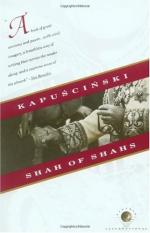|
This section contains 641 words (approx. 2 pages at 400 words per page) |

|
The Dead Flame, pages 131 to 152 Summary and Analysis
Kapuscinski uses an extended metaphor to compare the Shah to the producer/director/star of his own play, The Great Civilization. The Shah puts on a grand play and wishes to amaze and impress his audience, and all sorts of extras (lured by riches) are invited on stage with him. Props and scenery from all over the world are brought in. The Shah spends all his time on the stage and neglects the ground floor, where people are unhappy, exploited, and oppressed. His audience (the Iranians) do not recognize this strange play, and so they abandon it for one of the only things that still makes sense and has meaning, religion, as embodied in the mosque. Revolt (revolution) occurs, which in the play metaphor is akin to people forgetting their lines or stagehands...
(read more from the The Dead Flame, pages 131 to 152 Summary)
|
This section contains 641 words (approx. 2 pages at 400 words per page) |

|




